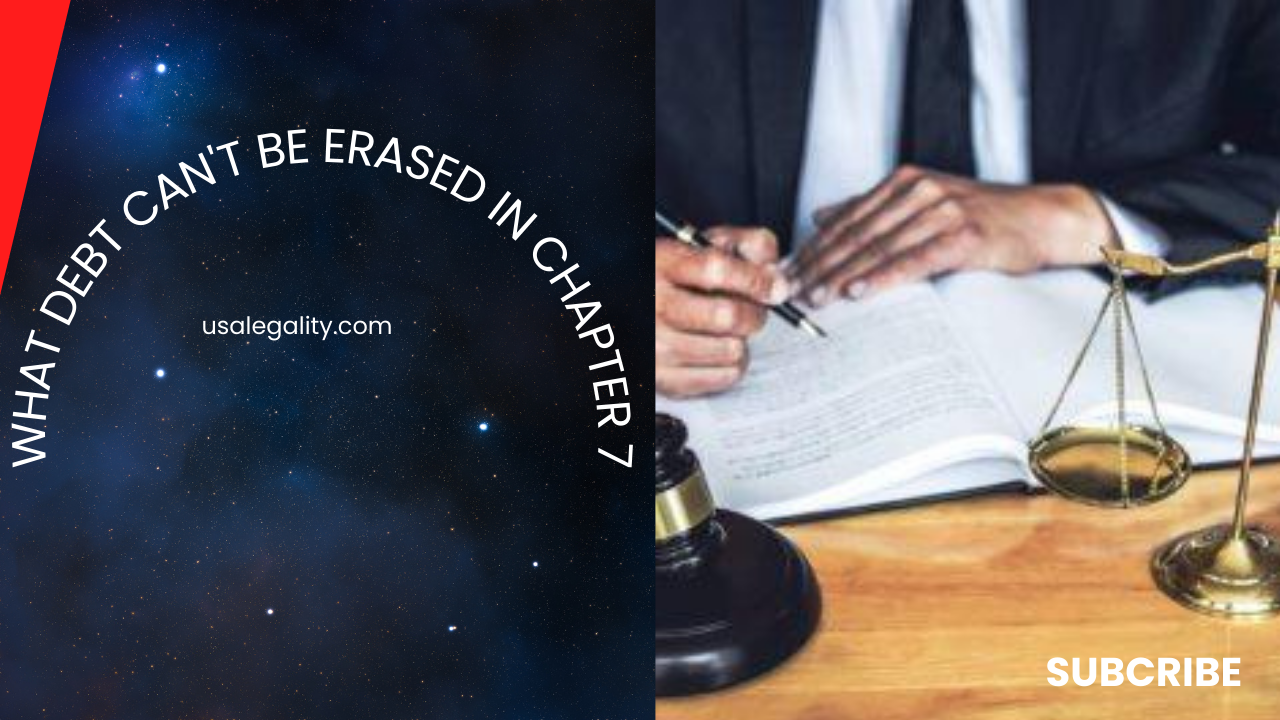Filing for Chapter 7 bankruptcy can offer significant relief from overwhelming financial burdens. However, not all debts are eligible for discharge through this legal process. Understanding what debt can’t be erased in Chapter 7 is crucial before deciding if it’s the right solution for you. This blog will discuss various non-dischargeable debts, explain the implications of these exceptions, and provide insights into the Chapter 7 process to help you make informed financial decisions.
Understanding Non-Dischargeable Debts in Chapter 7 Bankruptcy
Chapter 7 bankruptcy is a legal process that enables individuals to eliminate most unsecured debts, offering a fresh start. However, certain debts remain enforceable even after filing, as specified by the U.S. Bankruptcy Code.
Child Support and Alimony
Debts related to child support and alimony cannot be discharged under Chapter 7 bankruptcy. These obligations are prioritized to ensure the well-being of dependents and former spouses.
Tax Debts
See Also-How to Sell a House in Foreclosure: A Comprehensive Guide
Tax debts are often non-dischargeable, especially those owed within the past three years. Older tax debts may qualify for discharge if specific conditions, such as filing compliance, are met.
Student Loans
Student loans are rarely dischargeable unless the filer proves undue hardship in court. Meeting this criterion involves demonstrating an inability to maintain a minimal standard of living while repaying the loans.
Key Debts That Survive Chapter 7 Bankruptcy
Fines and Penalties
Government-imposed fines, including criminal penalties and civil fines, remain enforceable post-bankruptcy. Examples include traffic violations and court-ordered restitution.
Personal Injury Debts
If you caused personal injury or property damage while driving under the influence, debts resulting from such incidents cannot be erased.
Debts from Fraudulent Activity
Debts incurred through fraud, misrepresentation, or malicious intent are not eligible for discharge. Courts view these as liabilities that should remain enforceable.
What Debt Can’t Be Erased in Chapter 7?
While Chapter 7 bankruptcy eliminates many financial obligations, the following categories remain intact:
- Debts Not Listed in Bankruptcy Filing: Any debts omitted from your paperwork will not be discharged.
- Luxury Purchases: Debts incurred for luxury goods or services shortly before filing may be non-dischargeable if creditors challenge them.
- Debts Incurred to Conceal Assets: Financial obligations created to hide assets from creditors are exempt from discharge.
Implications of Non-Dischargeable Debts
Living with non-dischargeable debts requires careful financial planning:
- Child Support and Alimony: Continued payments may strain your budget.
- Tax Liabilities: The IRS or state agencies may pursue aggressive collection actions.
- Student Loans: Persistent student debt can limit your financial opportunities, such as buying a home or saving for retirement.
Navigating the Chapter 7 Process
Filing for Chapter 7 involves several steps, starting with gathering your financial records. Once filed, an automatic stay halts most collection actions, offering temporary relief. A court-appointed trustee oversees the liquidation of non-exempt assets to repay creditors.
Immediate Effects After Filing
- Automatic Stay: Protects you from creditor harassment.
- Trustee Review: A trustee evaluates your assets for liquidation.
- Credit Impact: Filing will significantly lower your credit score and remain on your report for ten years.
FAQs on Chapter 7 Bankruptcy
What happens immediately after filing Chapter 7?
An automatic stay goes into effect, halting creditor actions like wage garnishments or lawsuits.
What not to do after filing Chapter 7?
Avoid incurring new debt, transferring assets, or making major financial changes without consulting your attorney.
What is the downside of filing Chapter 7?
The primary downsides include a negative impact on your credit score and the inability to discharge certain debts like child support or recent taxes.
What happens to your bank account when you file Chapter 7?
Exempt bank accounts are generally protected, but significant balances must be disclosed to the bankruptcy trustee.
Conclusion
Understanding what debt can’t be erased in Chapter 7 is essential for anyone considering this form of financial relief. Non-dischargeable obligations, such as child support, certain taxes, and student loans, require careful financial planning and post-bankruptcy management. By consulting a qualified bankruptcy attorney, you can better navigate the process and make informed decisions about your financial future.
